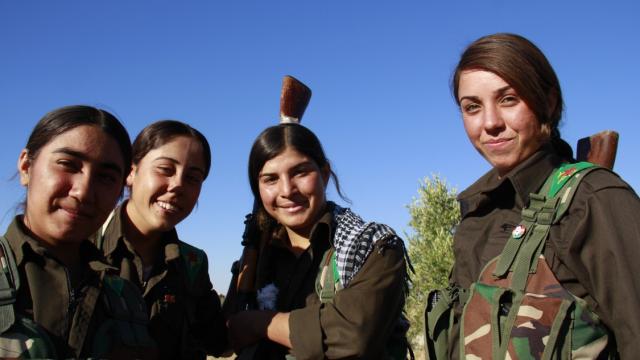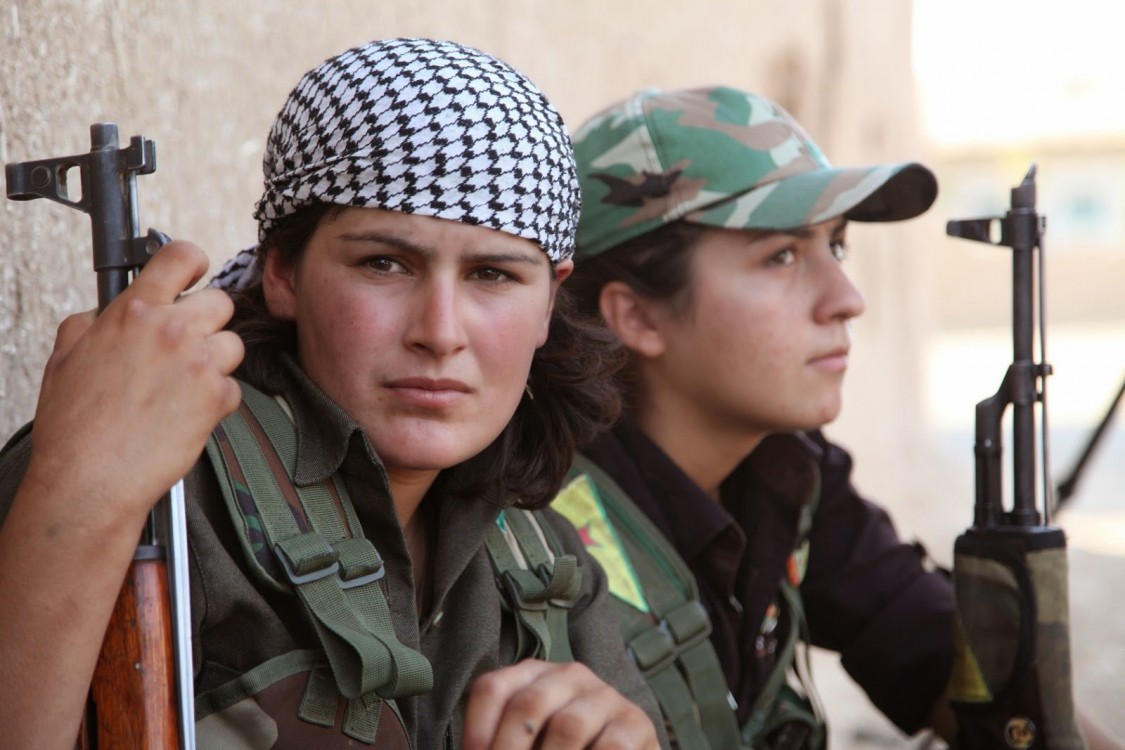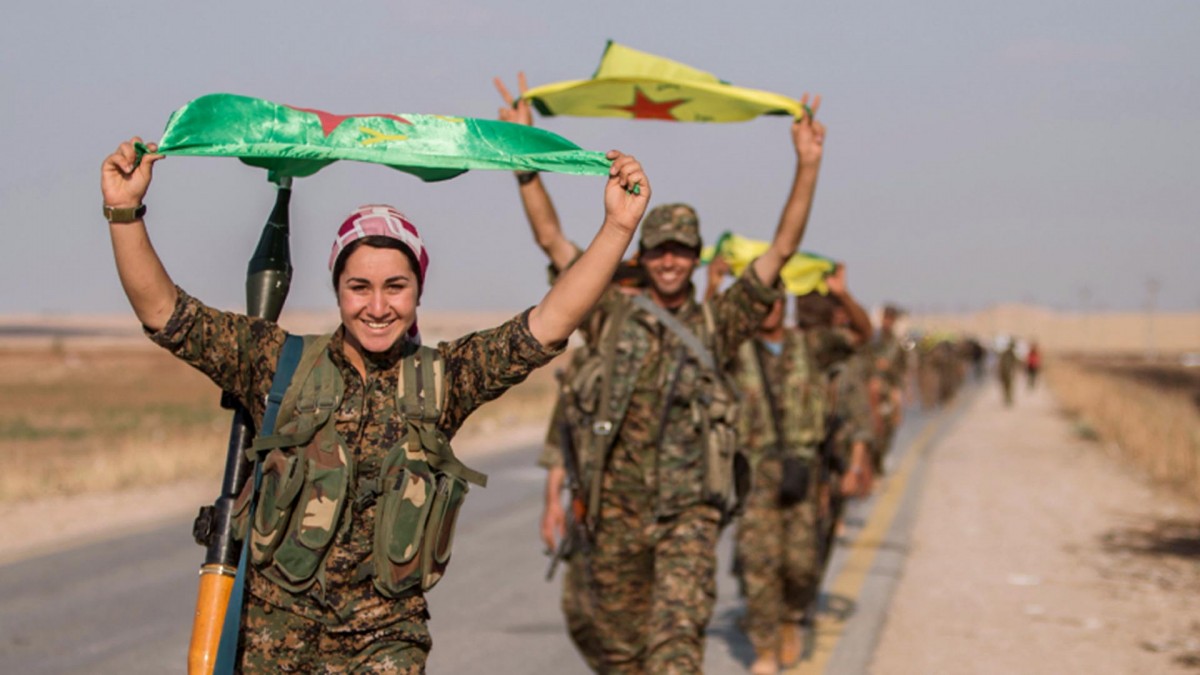
This is Part 2 in a new series about radical municipalism, looking at ways that people worldwide are organizing in their cities to build power from the bottom up. Read Part 1 (Brazil) Part 2 (Rojava), Part 3 (Chiapas), Part 4 (Warsaw), Part 5 (Bologna), Part 6 (Jackson), Part 7 (Athens) and Part 8 (Warsaw & New York), Part 9 (Reykjavík), and Part 10 (Argentina).
Rojava is a world-leading experiment in democracy emerging from the ashes of the Syrian War. The predominantly Kurdish region has created a new political model based on participatory local councils holding sovereignty. Through democratic confederalism a new civic identity is forming, and to understand its significance, one needs to realize an essential part of the Kurdish story is persecution.
NATO member Turkey, and ISIS, are committing war crimes against Rojava. Turkey has increased its oppression of Kurds in Turkey, particularly since 2015. Throughout history, Kurds have been persecuted. Attempts to build a Kurdish state have thus far failed. The impact of these two factors greatly explain what emerged in Rojava after 2012 when people became sovereign through peaceful revolution.
Answering the Kurdish Question: A New Identity
“My Kurdish identity has no value unless I do something” said Abdullah Öcalan, one of the ideological inspirations for the Rojava Revolution and a key figure in the story of Kurdish nationalism. Öcalan led the Kurdistan Workers' Party (PKK) until his detention and solitary confinement by Turkey in 1999.
From prison, Öcalan's political journey has guided Rojava. Once a Marxist freedom fighter who wanted to create a Kurdistan through guerrilla warfare, he transformed himself into an advocate of bottom-up municipal democracy. Since the early 2000s, Öcalan asserted that liberation for the Kurds must mean democracy for everyone.
Öcalan was influenced by other thinkers, most notably Murray Bookchin, an advocate of libertarian municipalism. Öcalan rejected fighting for a Kurdish state, arguing all this effectively means is that the police repressing you speak your language.
The failure of the PKK guerilla warfare against Turkey was another motivation for the shift in thinking. Ironically, after the PKK ideologically converted to self-defence and radical democracy, it was added to the world's terrorist list. Turkish lobbying was crucial to this process.
Öcalan's historical interpretation called for democratic confederalism as a dual power against the modern state. The problem with the state, he said, was that it was built on oppression – not least male domination and class oppression dating back 5,000 years. Women's empowerment and local democracy provide a remedy. Democratic confederalism is a system of local councils where autonomy is held at the lowest level, something realized in Rojava since 2012.
Although Öcalan has no institutional control in Rojava, his ideas and their execution have flourished there.
Rojava: Turning Theories into Practice
Northern Syria was a relative safe haven for Kurds in the late 20th century. Ideas and people moved in from Kurdish Turkey, including democratic confederalism. In 2004, the peace was shattered when the Syrian state massacred Kurds in Qamişlo [today's Rojava].
Syrian repression strengthened the Kurds' necessity for self-defence, a pillar of democratic confederalism. This catalysed the formation of secret democratic revolutionary local councils, including women's Yekîtiya Star. These councils grew into the participatory architecture of Rojava.
One self-defence element includes the peace and justice commissions, where justice is administered by local people based on reconciliation. Rojava exemplifies do-it-yourself culture, not least in every aspect of self-defence. Everyone in society receives basic training in Asayîs, enabling them to perform the function of the police, although they are accountable directly to the local councils, not to the state.
Eventually, Rojava wants to abolish having dedicated Asayîs, training each individual to take responsibility for security. To defend themselves against ISIS, Turkey and other attacks, the people of Rojava have also formed self-defence forces, which are mixed and all women.
Writing about the myth surrounding the women fighters of Rojava, Meral Çiçek, from the Kurdish Women's Relations office in Erbil, explains:
“...Self-defence also means to be a subject, to fight back, to say no and to act. It's an action...women's self-defence in Rojava and elsewhere is not only about protecting yourself with a weapon against armed attacks. In a deeper sense: It's also not only about defence. It's about creating. Creating life. A new life. An alternative live. And all the women who today defend their country, their people, themselves, their dreams and their project of a new future are at the same time subjects of this creation process.”
Bookchin, Öcalan and the whole democratic confederalist experiment in Rojava calls for living within nature so that the land – like the people – is not exploited. This connects back to Kurdish ties to Zoroastrianism, an old way of living in harmony with nature.
Self-reliance makes sense for any society, but it has been particularly necessary for Rojava, which finds itself surrounded by hostile enemies and often under embargo. Rojava's survival also rests on a third element relating to the new all-inclusive identity. The cultural mosaic of Rojava can be seen in the formation of a new university in Qamislo. Like the Rojava constitution, the university is open to all, including Kurds, Arabs, Assyrians, Syriacs, Armenians, Turkmen and Chechens.
Local councils rely on participation based on the idea that identity means action. The people of Rojava, in every neighbourhood, have created a web of nine councils that look after everything from education to security, and from setting up workers' cooperatives to providing welfare. In modern capitalists states, NGOs do the work that the state fails to do, for instance feeding the homeless or protecting vulnerable people. In Rojava, there is no state; instead, NGOs do everything, controlled democratically from below.
The ethnic inclusivity of Rojava also means that it has changed its name. It is now the Democratic Federation of Northern Syria (DFNS). 'Rojava' is Kurdish. For the same reason the crucial women's movement, Yekîtiya Star, became Kongreya Star. DFNS also welcomes all refugees from surrounding warn-torn Syria, respects every international human rights law, and offers a peaceful solution for the whole of Syria. Many consider it a crime against humanity that DFNS has been excluded from peace talks by imperial state powers.
DFNS and a Global Radical Municipalism
Rojava is unique, yet it reflects a wider radical municipalist movement. Similarly, Turkey's Erdoğan can be compared to the march of ultra-nationalist, authoritarian, misogynistic leaders. The municipal space is a key battleground against this kind of leadership. Examples include Brazilian intersectional feminists and networks, and city halls in Spain. In the U.S., town halls have become a key place to register discontent and to fight back against Trump. On a pan-European scale, cities pushed the Refugees Welcome campaign as a way of taking on growing state-supported anti-migrant sentiment.
All radical municipal projects, not least Rojava, are built independently on their own ideological foundations. They germinate from the social movements and their own contexts. But similarly, they respond to globalized crises. In practice, these movements are based on collective action and they build progressive identities as they challenge systemic oppression and injustice. Radical municipalism reimagines a common humanity, something exemplified in the Democratic Federation of Northern Syria.
Further reading on Rojava:
Rojava: Antidote to the Crises of Capitalism
Rojava: Another Middle East Is Possible
Rojava: No Democracy Without Women's Liberation
Rojava: Building a Society Beyond a State
Read Part 1 (Brazil) Part 2 (Rojava), Part 3 (Chiapas), Part 4 (Warsaw), Part 5 (Bologna), Part 6 (Jackson), Part 7 (Athens) and Part 8 (Warsaw & New York), Part 9 (Reykjavík), and Part 10 (Argentina).















